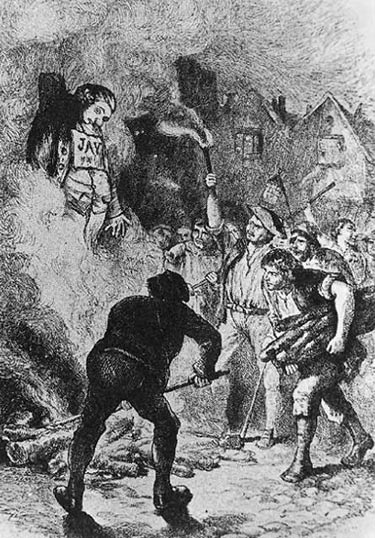The Jay Treaty of 1795 was widely regarded as a hated and unpopular treaty between the United States and Great Britain. Prior to the treaty, the US was faced with a variety of military conflicts from the native westward Indians in the Ohio territory, British occupation of the Ohio territory, and naval skirmishes involved with both Britain and France during France’s revolution, leading to the seizure of many American ships and sailors. Washington, unwilling to escalate a conflict with a still developing nation, asked John Jay to negotiate a treaty to stop the conflicts. The resulting treaty, known as the Jay Treaty, was widely unpopular and hated by the public, but still implemented by Washington. The treaty did next to nothing in being reprimanded for British assaults, both navel and in the Ohio territory. Instead, it only guaranteed a delayed exit of the British from the territory and limited the available trade of the US, cutting off their access to the British West Indies, a major port for the US.
Public reaction the treaty was violent and destructive, with many petitioning actions such as an amendment to the constitution to be able to recall US senators. Effigies of Jay were burnt, Hamilton was stoned when trying the justify the treaty, and mobs in Pennsylvania proclaimed, “Kick this damned treaty to Hell!” Many people condemned the Jay treaty as an action that destroyed US sovereignty and international power, while also violating French trading policies. Spearheading this hate were Jefferson and Madison, both of whom thought the treaty violated US economic strength and French relations, increasing the political divide between Hamilton’s British favored policy and Jefferson’s French.
 Despite hate against the treaty however, the outcome of the Jay treaty was nowhere near the possible disaster that could ensue if it were not passed. The possibility of war against Great Britain would have certainly damaged the American economy far greater than possible tariffs, and the treaty allowed for gradual development, although stagnated by trade restrictions. Furthermore, the treaty opened the west for greater expansion as a result of Britain agreeing to remove officers from the area, enriching more Americans with the valuable resource.
Despite hate against the treaty however, the outcome of the Jay treaty was nowhere near the possible disaster that could ensue if it were not passed. The possibility of war against Great Britain would have certainly damaged the American economy far greater than possible tariffs, and the treaty allowed for gradual development, although stagnated by trade restrictions. Furthermore, the treaty opened the west for greater expansion as a result of Britain agreeing to remove officers from the area, enriching more Americans with the valuable resource.
I really enjoyed reading this article. One aspect of this article I thought you did quite well was how you elaborated on the effects of the John Jay Treaty on different groups, and connected different historical figures, such as Hamilton, Washington, Madison, and Jefferson. I also found it interesting that it seemed most colonists were very eager to choose France over Britain--previously, I had thought that the reaction to the John Jay treaty was extensive, but wasn't as significant as you mentioned in this article. Well Done!
ReplyDeleteThis comment has been removed by the author.
ReplyDeleteIt is really surprising to me that Hamilton was actually stoned when trying to defend this treaty. Because of this, I decided to do a little more research on Hamilton's view on Jay's Treaty. It turns out that when Washington received the treaty from Jay, he first immediately consulted Hamilton on whether or not he should sign. Although the treaty was not much in favor of the Americans, Hamilton wrote an article explaining to Washington how this treaty will prevent a potential wound to the country's "growth and prosperity." He reasoned that this new nation was in no position to call for equality in a treaty with what was arguably the strongest country in the world during that time. Although Hamilton's article did not immediately convince Washington, Washington eventually signed the treaty.
ReplyDeleteSource: let.rug.nl/usa/biographies/alexander-hamilton/the-jay-treaty-controversy-(april-august-1795).php
This was a really well-written post. I think that noting that Washington signed off on it even though it was so hated is really important because it shows how Washington wanted to do what he thought would be most beneficial even if the public didn't agree much.
ReplyDeleteI thought that this post was really well written! I liked how you presented information on the public reactions to the treaty. I also found it helpful that you stated what was actually included in the treaty’s provisions. I did not know that it limited trade until I read this post. What is also interesting to note is how this treaty led to the formation of more divided political parties (namely the Federalists and Republicans). As you wrote, the issue was very divisive between Hamilton - who supported the British - and Jefferson - who supported the French. The idea that one faction of Americans supported the British and the other supported the French allowed the formation of two distinct viewpoints that would eventually become the Federalist and Republican parties. Some, like Jefferson, thought the treaty was too pro-British, which was a nation that should not be trusted. His supporters became the Republicans, and those who supported Hamilton and his views were the Federalists. (https://www.history.com/this-day-in-history/george-washington-signs-jay-treaty-with-britain)
ReplyDelete